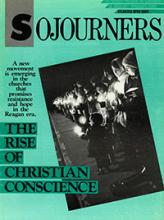The 1984 presidential election results were widely read as a victory for selfishness and a mandate for growing inequality. Then on November 11, in the midst of the bleak post-election mourning period, the National Conference of Catholic Bishops burst onto the political scene with a message that, given the context, could only be read as good news to the poor. That message was of course contained in the first draft of the bishops' pastoral letter, entitled "Catholic Social Teaching and the U.S. Economy." The bishops assert the priority of the poor in economic decision making and advocate a variety of public policies designed to reduce inequalities of wealth and power in the United States.
Since the pastoral letter is intended to instruct the faithful as well as influence public debate, it begins with reflection on Scripture and church tradition, moves on to establish some moral ground rules for economic life, and only then ventures into the realm of policy proposals.
In proclaiming the broad biblical and ethical principles of economic life, the bishops are at their best. They affirm the "preferential option for the poor" taken by the Latin American bishops as "a valid interpretation of the biblical witness" and the "fundamental norm" for their economic judgments. In examining the Genesis creation account, the bishops "find a constant affirmation that the goods of this earth are common property and that men and women are summoned to faithful stewardship rather than to selfish appropriation." And from their biblical reflection, the bishops conclude that meaningful work and access to the material necessities of life are fundamental human rights that any just economic order must respect.
Read the Full Article

